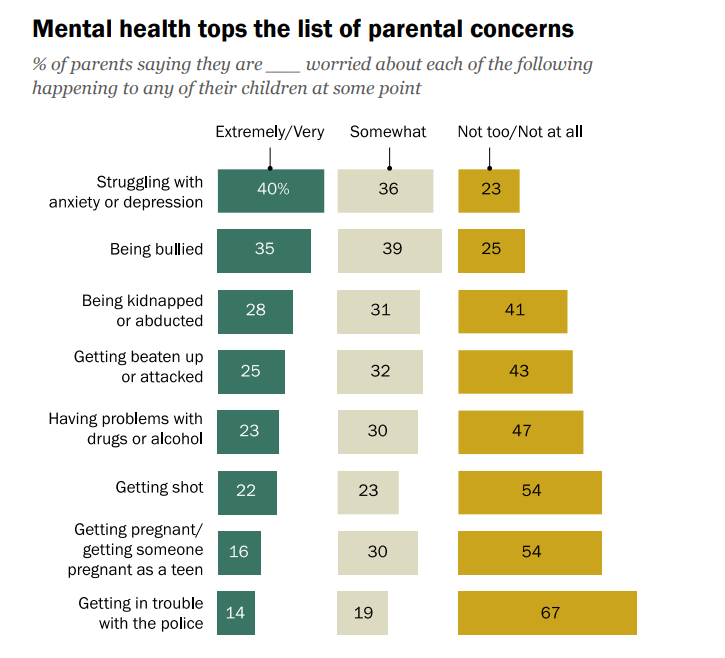Parents can now be added alongside providers, health insurers and employers to the list of stakeholders with growing concerns about mental health, according to a study by the Pew Research Center.
The study found that 40% of parents call the fact that their children might be struggling with anxiety and depression their No. 1 concern—something they’re extremely or very worried about—followed by 35% of parents who put the fear that their children are being bullied into that category.
“These items trump parents’ concerns about certain physical threats to their children, the dangers of drugs and alcohol, teen pregnancy and getting in trouble with the police,” the study said.
COVID-19 pushed mental health problems in the U.S. to the forefront, highlighting what most experts consider serious flaws in a dysfunctional system, including a lack of mental health providers that forces primary care physicians to do most of the work in this field. Employers have named mental health as one of their main concerns in a post-COVID pandemic world, and children increasingly appear to be more vulnerable to behavioral health concerns than previously thought.

Emma Hoo, the director of value-based purchasing at the Purchaser Business Group on Health (PBGH), told Fierce Healthcare that “adolescent mental health is a major challenge both from an access perspective and design of care delivery that is team-based and coordinated with primary care/pediatric care—and further complicated by the ability to connect adolescents with providers matched by experience and cultural sensitivity.”

PBGH comprises about 40 large private and public employers whose members spend about $350 billion a year to cover 21 million Americans.
“By many accounts, the school closures had wide-ranging negative impacts,” Hoo said. “Some PBGH members have implemented enhanced programs for adolescent mental health. During COVID, many employers augmented tele-behavioral health, expanded digital health tools and other resources.”
Ellen Kelsay, president and CEO of the Business Group on Health, told Fierce Healthcare that employers have been placing a growing emphasis on mental health coverage for years.
“Their focus on mental health was heightened during the pandemic, and, now, an emerging area of concern relates to youth and adolescent mental health,” said Kelsay. “Among this population, rates of depression, anxiety and social isolation increased considerably during COVID-19 and show no signs of abating in the foreseeable future.”
The Business Group comprises large employers, including 74 Fortune 100 companies, that provide coverage for about 60 million workers, retirees and their families in about 200 countries.
Kelsay added that in response to what’s being described as a mental health crisis in the U.S. “employers are expanding resources, training and services to support employees and their dependents; this includes expanded mental health programs/access as well as robust caregiver and leave offerings.”

Pew researchers analyzed data in a survey conducted from Sept. 20 to Oct. 2, 2022, of 3,757 parents in the U.S. with children under 18, and most of the respondents belong to Pew’s American Trends Panel. In addition, data were extracted from the Ipsos KnowledgePanel, which oversampled Black, Hispanic and Asian parents.
The study found differences along racial and ethnic lines. Lower-income and Hispanic parents worried more about their children’s physical safety, teen pregnancy and problems with drugs and alcohol than Black, white, and Asian parents. More Black and Hispanic parents say they’re extremely or very worried about their children getting shot or in trouble with police than White or Asian parents.
“By significant margins, mothers are more likely than fathers to worry about most of these things,” the Pew study said.
The study highlights several areas where mothers and fathers diverge in terms of how they see their roles and performance as parents.
“For example, about half of mothers (51%) say they tend to be overprotective, compared with 38% of fathers,” the study said. “In turn, fathers (24%) are more likely than mothers (16%) to say they tend to give their children too much freedom.”
Differences in how mothers and fathers perceive their approach to parenting can also be seen across racial, ethnic and income lines, according to the study.
“About half (49%) of White parents say they are raising their children in a similar way to how they were raised, compared with 42% of Black parents, 37% of Asian parents and 32% of Hispanic parents,” the Pew study said. “And while 51% of parents with upper incomes say they are trying to raise their children similarly to how they were raised, smaller shares of those with middle (46%) and lower (35%) incomes say the same.”